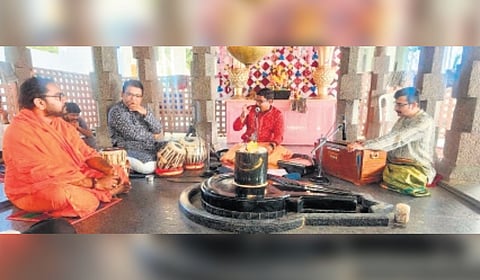

HYDERABAD: It was early in the morning—well, 7.30 am did seem pretty early on a Sunday. We made our way through the quiet streets of the Old City, the slow pace of the morning guiding us to Samsthan Shree Bhatji Bapu Maharaj Trust in Uppuguda. We were immediately stunned as we beheld the 400-year-old temple, surrounded by greenery and devoid of the city noise and chaos. Inside, people gathered around the sacred Shiva Linga, enjoying live classical music performances. Organised by Tatvaa, the Morning Raaga series ensured that we lost ourselves in the serene moment, right in the middle of the city.
Set in a sprawling five-acre green space near Old City, the 19th monthly concert of the series aimed at reviving the ancient tradition of temple music and featured a captivating vocal recital by Abhijit Apastambh from Ahmednagar, with Prashant Gajre on the tabla and Rahul Deshpande playing the harmonium.
They melodiously kicked off the concert with Raaga Natbhairav, performing a Vilambit Khayal bandish for the song Pinakdhar Shankar, followed by Sab Mil Gao Bajao, sung in Rupak bandish with a Tarana in Drut Ektaala. Next, they enchanted the audience with Raaga Bhatiyar, Madhyalaya bandish and Taala Jhaptaala in the song Anand Karo Ghadi Mangal Ki Aayi.
The audience was equally taken with Mai Toh Tero Naam Japta Hun, sung in Drut Ektaala bandish. They wrapped up with Raaga Ahir Lalit, offering a bandish in Taala Rupak for the song Jaag Jaag Sajni, and another in Taala Teentala for Ja Ja Re Ja Re Kagva. A soulful bhajan in Raaga Bhairavi, Shiv Ke Man Sharan Ho, was a final, warm embrace of divinity.
Indeed, temple music is divinity personified. Temples were actually home to many musicians, including Bhatji Bapu Maharaj, a saint and musician in the 19th century, who used to come to this very spot to practice. Known for his devotion and mastery of the Tappa style, Maharaj’s life was dedicated to spreading divine teachings through his music. “This temple was built in his honour, and even today, musicians continue to come here to offer their Gayan Seva, keeping the tradition alive,” explained Akhilesh Washikar, founder of Tatvaa Arts.
Dilip Ratolikar, an attendee, said that getting to hear these raagas in the morning was a truly special experience. “The vocalist sang beautifully. He may not be very well-known yet but his performance was impressive! He started with Raaga Natbhairav and developed it like a true professional. After that, he sang Raaga Bhatiyar, making for a beautiful melody. Both were presented really well. The organisers did a wonderful job and pulled off an excellent event,” he added.
Well, attendees had much praise for the raagas. And rightly so for each one is that special. Some raagas can only be awakened in the morning while others can only grace our ears in the evening. There are seasonal raagas too—Basant Raaga in spring, Malhar Raaga in monsoon, and Hemant Raaga in winter.
Undoubtedly, the Morning Raaga series is a genuine and passionate initiative to keep Hindustani Classical music alive. Tatvaa has also held concerts at Badruka College, Hussain Sagar Lake, Botanical Gardens, and Lumbini Park.
Morning Raaga is not just a concert series but a celebration of the connection between music, devotion, and the divine, making it a must-attend for Hindustani Classical music aficionados who seek both artistic and spiritual fulfilment.